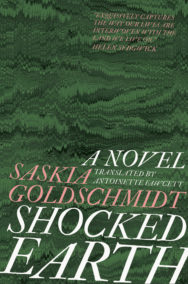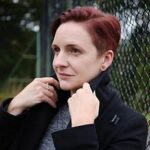‘She’s more interested in dead birds than in living ones.’
Femke, her mother Trijn and her grandfather have very different ideas about how to run their family farm. Tensions between mother and daughter are growing; Femke wants to switch to sustainable growing principles, whilst her mother considers this an attack on tradition. To make matters worse, their home province of Groningen is experiencing a series of earthquakes caused by gas-extraction near their farm. Shocked Earth investigates what it means to have your identity intensely entwined with your place of birth and your principles at odds with your closest kin. And how to keep standing when the world as you know it is slowly falling apart. Here is an excerpt.
Extract taken from Shocked Earth
By Saskia Goldschmidt, translated from Dutch by Antoinette Fawcett
Published by Saraband Books
Every step makes the rime crunch. The grasslands have changed to a carpet of glassy frost-spines and little stars of ice, glittering in the sunlight. There’s an odd stillness hanging over the countryside. For once no fierce wind shakes the grasses, reeds and poplars round the scattered farmhouses. For once there’s no shimmering, surging, rippling, billowing, flapping, rattling and rolling. The clay lies heavy in thick furrows that stretch to far beyond the horizon.
The maar, a winding watercourse, has been changed to a crusty road of ice. From behind the horizon the sky flames out bright blue and brilliant pink. Siepke’s Sleepstead, an old sheep barn, seems to float up out of veils of mist. The spindly shapes of bare trees loom up along the country road in the distance.
The air is so cold that it’s as if the lungs are closing up, just as a mussel shell closes when danger threatens. In this cold everything is slower and more difficult.
Femke hears a soft whoosh: seven swans flying towards the mouth of the river, tired wingbeats, longing for water. Is the estuary still clear of ice?
The moon, pale and almost full, is still high in the heavens, while the day is already well on its way. She keeps on walking firmly, towards the reedbeds. Two days ago, moorhens and mallards were still swimming around in the little ice hole. The wigeons, tufted ducks and teal had already vanished, flying away from the ice, to the coast or down south. She’d like to under- stand birds better. How do they warn each other that it’s getting cold or that it’s time to migrate? How do they know where to meet each other? And who decides when they’ll fly up and make that staggering journey? And why does one of them sometimes stay behind? In the winter, every now and then, she sees a solitary bird whose kin have long gone to Africa.
She uses the rubber handgrip to detach the electric wire, steps through the gateway, and attaches it again, even though the electric fence has no purpose in the winter. She walks past the metres-high reeds. Every stem is wrapped in a wafer-thin crystalline layer of ice. The rime has turned the plumy flower spikes into all kinds of amazing, whimsical shapes. There’s no sound of ducks quacking, or grunting, or growling, nor the friendly ping ing of the bearded tits, not even the honking of geese.
She goes along a reed-fringed branch of the maar, and then the pool comes into sight, glittering in the full sunlight, a dark stretch of icy mirror-glass, with here and there some little tufts of reed-stalks.
In the middle of the frozen pool there’s a heap of feathers, an untidy white coating of down. It’s an enormous swan. Its long neck is folded back and its head is tucked into its wings.
She throws a lump of clay at it. The clod lands close to the swan, which lifts its head and tries to rise, clapping its wings wildly, but it can’t move from where it is.
She steps onto the ice and shuffles towards the centre, and then in the reeds at the edge of the pool she sees another swan, anxiously scurrying back and forth, its neck forming a graceful S, swaying its head from side to side. Its black knob and orangey-red beak are vivid against the bright white. It’s hissing and beating its wings.
As she gets closer to the bird desperately flapping on the frozen pool, it tries to fly up, but it still can’t free itself.
She hurries home and dives into the barn without anyone seeing her. This isn’t the right moment to bump into her mother. She’s more interested in dead birds than in living ones. If a bird crashes to death against the spic-and-span farmhouse windows, then Trijn stuffs it into a plastic bag and puts it in the separate dead-bird freezer, before eventually transforming it into a cheerfful little corpse in her Dead Bird Museum.
Femke swaps her normal mittens for thick work gloves, grabs the aluminium ladder and a claw hammer, and hurries back to the reedbeds.
The swan is beating its wings and it lashes out at her with its beak as she creeps on her belly across the ladder towards it. The other swan comes closer, snorting and hissing. She makes an abrupt gesture to keep it at a distance, then holds the swan that is trapped in the ice firmly by its neck and presses it down. She is now half lying on top of the paralysed creature. She breaks the ice with the hammer and slowly shuffles back along the ladder. The wingbeats become more and more frantic, and once the swan is freed it slaps its feet helplessly across the icy surface, until it reaches the edge of the pool, wings flapping, and then with loud, indignant grunts it flies up with the other swan, vanishing in the direction of the river delta.
Shocked Earth by Saskia Goldschmidt, translated from Dutch by Antoinette Fawcett is published by Saraband Books, priced £9.99.
ALSO IN THIS ISSUE

 Back From the Brink
Back From the Brink
‘Canoeing slowly along the tree-shaded Blue Spring, it was the sound of frequent nose blowing on the …

 The Corrour Bothy: A Refuge in the Wilderness
The Corrour Bothy: A Refuge in the Wilderness
‘Today, all old buildings that survive in the wild solidly enough to still provide basic shelter are …













